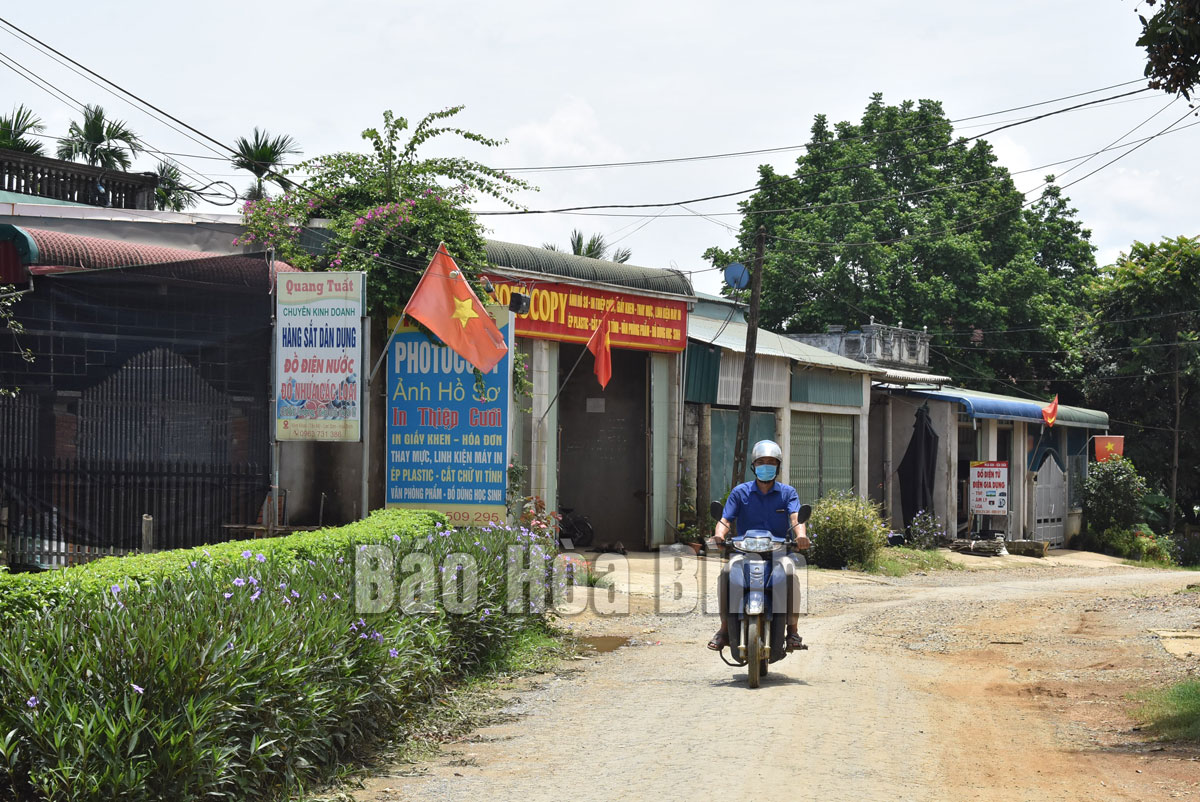
(HBO) – Improving leadership capacity and combat strength of the local Party Committee, pooling the power of all people to build new-style rural areas, using advanced technologies, switching to plants and animals with high economic value to draw investment, developing industry, handicrafts and services are major goals of Tan My commune, Lac Son district during the 2020-2025 period.

Tan My commune of Lac Son district has pooled capital to build, perfect transportation infrastructure.
Following the communal Party Congress for the 2020-2025 tenure, the standing board of the communal Party Committee held conferences to raise awareness of the resolution among key Party members in hamlets, communes, Vietnam Fatherland Front committee, and mass organisations. It also devised an action programme to realise the approved resolution, with requirements in the fields of socio-economy-culture, national defence-security and Party building.
Permanent Vice Secretary of the communal Party Committee Bui Thanh Luan requested continuing to follow the Resolution adopted by the fourth plenum of the 12th National Party Congress on strengthening Party building and rectification, driving back degradation in political thought, moral virtue, lifestyle, "self-evolution” and "self-transformation” behaviours in internal affairs in accordance with the Politburo’s Decree No.05-CT/TW on promoting the studying and following of thoughts, morals and lifestyle of Ho Chi Minh each year.
By 2025, the commune targets a 10 percent growth in annual production value, average income per capita of 60 million VND, an annual reduction of 1 percent in the rate of poor households. All people will have health insurance cards, all schools meet national standards, all households have clean toilets and water.
To such end, the communal Party Committee will direct residents to change the structure of plants and animals in the direction of using advanced technologies in production, switch from less efficient crops to those with high economic value such as squash, jicama and watermelon.
The commune will also offer all possible support in terms of land, capital and other resources, encourage farmers to expand concentrated farms, step up the construction and upgrade of transportation infrastructure and irrigation works to improve their use efficiency, create conditions to develop local industrial zones and complexes, trade and services. The communal People’s Committee will work with the district Centre for Vocational Training to open training courses, introduce jobs, striving to generate 250 local jobs while working closely with competent agencies to build traditional goods./.
The Standing Board of the Hoa Binh provincial Party Committee has agreed in principle on a proposal by the Standing Board of the Party Committee of Hoa Binh city to gather feedback on the city’s 1:2000 zoning plan, which forms part of its broader urban development strategy.
Hoa Binh province has made notable progress in public administration reform and digital government development, with the satisfaction index among citizens and businesses reaching over 84%, according to recent government evaluations.
Thanks to great efforts by local authorities in recent times, the governance and public administration performance of Mai Chau district has been significantly improved.
In the afternoon of June 6, the Party Committee, the People's Council, the People's Committee and the Fatherland Front of Lac Son district solemnly held a meeting to celebrate the 139th anniversary of the district's founding (1886–2025) and the 79th anniversary of the establishment of the district's Party Committee (1946–2025). There was the attendance of Mr. Bui Van Thang, the Vice Chairman of the Provincial People's Council; Mr. Quach Tat Liem, the Vice Chairman of the Provincial People's Committee; Ms. Dang Bich Ngoc, the Deputy Head of the National Assembly Delegation of the province; as well as the former leaders of the province and district through various periods, who are the natives of the district.
Implementing the Politburo’s Resolution No. 57-NQ/TW on breakthroughs in science – technology, innovation, and digital transformation is a golden opportunity for the northern mountainous province of Hoa Binh to renew growth model, improve competitive edge and shorten digital gap.
Resolution 57-NQ/TW, issued by the Politburo on December 22, 2024, identifies sci-tech, innovation, and digital transformation as strategic breakthroughs to build a developed and prosperous nation. In Hoa Binh province, this spirit is not just a slogan, it’s being put into action through concrete initiatives that form a "new development triangle”: digital citizenship, digital economy, and digital administration.



